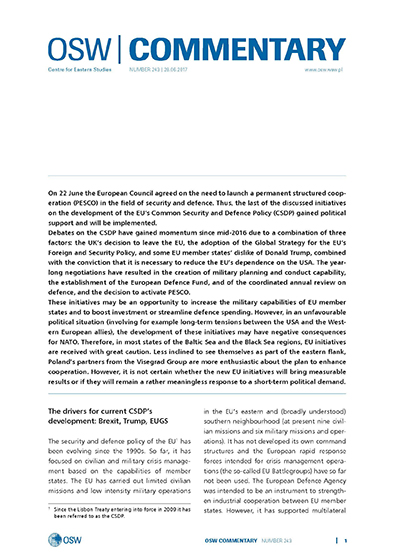Germany’s ‘refugee’ problem. The most important test for Chancellor Merkel and the grand coalition
Germany’s ‘refugee’ problem. The most important test for Chancellor Merkel and the grand coalition
Author(s): Artur Ciechanowicz
Subject(s): Security and defense, Migration Studies, Geopolitics
Published by: OSW Ośrodek Studiów Wschodnich im. Marka Karpia
Keywords: Germany; refugee problem; Chancellor Merkel
Summary/Abstract: The rapid increase in the number of immigrants from outside of the EU coming to Germany has become the paramount political issue. According to new estimates, the number of individuals expected arrive in Germany in 2015 and apply for asylum there is 800,000, which is nearly twice as many as estimated in earlier forecasts. Various administrative, financial and social problems related to the influx of migrants are becoming increasingly apparent. The problem of ‘refugees’ (in public debate, the terms ‘immigrants’, ‘refugees’, ‘illegal immigrants’, ‘economic immigrants’ have not been clearly defined and have often been used interchangeably) has been culminating for over a year. Despite this, it was being disregarded by Angela Merkel’s government which was preoccupied with debates on how to rescue Greece. It was only daily reports of cases of refugee centres being set on fire that convinced Chancellor Merkel to speak and to make immigration problem a priority issue (Chefsache). Neither the ruling coalition nor the opposition parties have a consistent idea of how Germany should react to the growing number of refugees. In this matter, divisions run across parties. Various solutions have been proposed, from liberalisation of laws on the right to stay in Germany to combating illegal immigration more effectively, which would be possible if asylum granting procedures were accelerated. The proposed solutions have not been properly thought through, instead they are reactive measures inspired by the results of opinion polls. This is why their assumptions are often contradictory. The situation is similar regarding the actions proposed by Chancellor Merkel which involve faster procedures to expel individuals with no right to stay in Germany and a plan to convince other EU states to accept ‘refugees’. None of these ideas is new – they were already present in the German internal debate.
Series: OSW Commentary
- Page Count: 12
- Publication Year: 2015
- Language: English
- Content File-PDF

